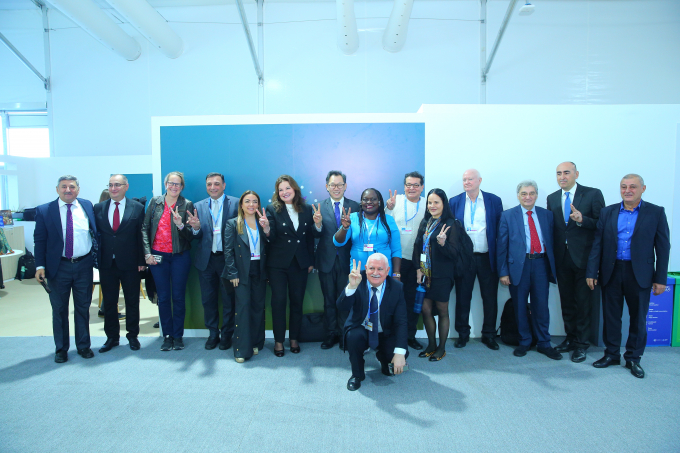Today, within the framework of COP29, the International Eurasia Press Fund (IEPF) and "Roots of Peace" organization jointly organized a panel discussion titled "Restoration of Peace, Land, and Ecosystems through Demining and Agriculture." The event focused on the restoration of polluted and devastated lands worldwide, strengthening peace, and reintegration of conflict-affected communities. Held at the Azerbaijan National NGO Forum Pavilion, this side event emphasized that the threat of landmines is not only a safety issue but also a serious challenge to sustainable development and ecological balance.
The opening remarks were delivered by Umud Mirzayev, President of the IEPF, who highlighted the dual challenges of safety and ecological threats posed by mine-contaminated areas. He stated: “We are not just talking about clearing landmines; we are talking about passing these lands on to future generations in peace. Clearing the land of mines means reviving life—boosting agriculture, resettling people, restoring economic activity, and creating a new ecosystem.”
Concluding his speech, Mirzayev expressed gratitude to the event participants and esteemed guests: “I want to thank our international partners who have supported us on this journey. I hope that the issues discussed and decisions made here today will contribute to a safer, sustainable, and restored world for future generations.”
Following his speech, a video prepared by IEPF on the mine problem and the initiative aligned with the 18th Sustainable Development Goal (SDG) was showcased. After the video presentation, Wook-Jin Chang, Head of the UN's NGO Department, took the floor, emphasizing the indispensable role of NGOs in peacebuilding. He discussed their significant role in collaborating with conflict-affected communities and delivering international support to local populations.
He stated: “I am deeply saddened to hear about the region's challenging legacy of conflict. I learned that over 1.5 million landmines are still deployed here. People continue to suffer from unexploded ordnance and landmines—an ongoing reminder of their persistent impact on community safety, economic resilience, and environmental restoration. Sadly, since November 10, 2020, 382 Azerbaijani citizens have become victims of landmines.”
Ramil Azizov, Head of the Awareness and Victim Assistance Department at the Azerbaijan National Agency for Mine Action (ANAMA), spoke about the significance of demining in preserving ecosystems and human life: “The destruction of mines and other remnants of war through humanitarian mine clearance operations ensures the safety of flora and fauna. Today, Azerbaijan, with over 11,000 square kilometers of contaminated land, is one of the most heavily mined countries in the world. Since November 2020, ANAMA and other demining organizations have cleared more than 172,786 hectares of land. Most of the cleared areas have been dedicated to agriculture, ecological zones, and residential use.”
Following the ANAMA representative, Heidi Kuhn, founder of "Roots of Peace," shared insights on her globally recognized initiative, "Mines to Vines," and its impact on communities, as well as its expanding scope. Reflecting on her visits to Azerbaijan, she noted that establishing vineyards in demined areas not only revitalizes the economy but also brings renewed hope to people’s lives.
The panel also featured speakers such as Emil Hasanov, an international expert on mine action; Thomas Anderson, Chairman of the International Knowledge Economy and Enterprise Development Organization (IKED); and Kamel Esseghairi, President of the Arab Renewable Energy Platform.


